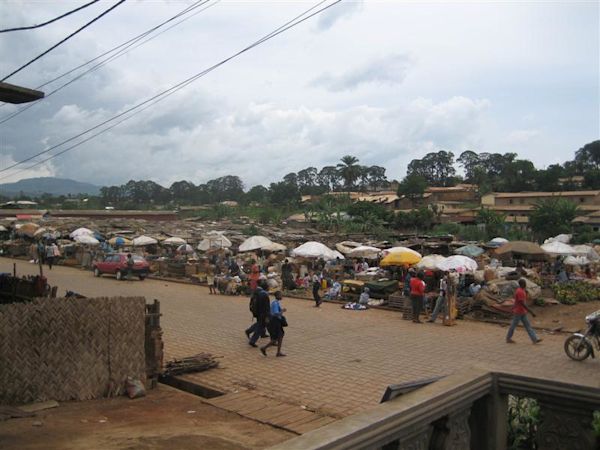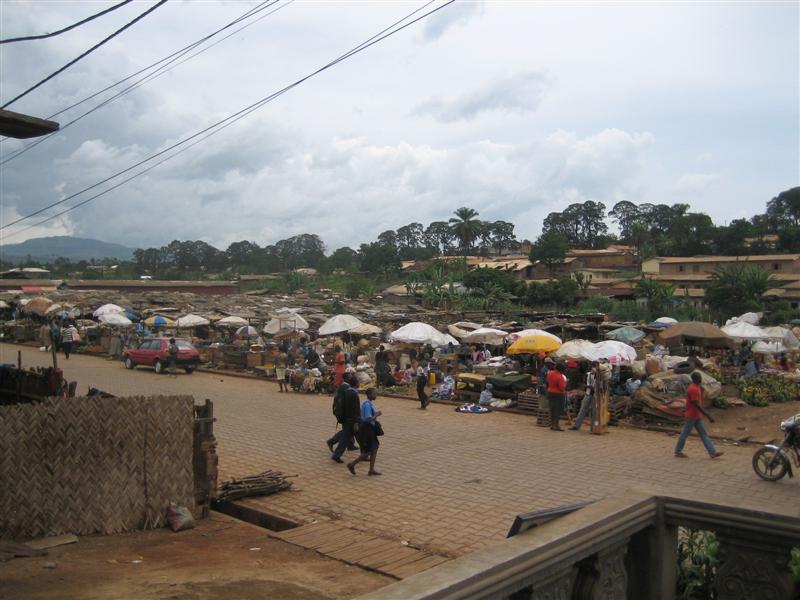Buy’em, Sell’em: The Food Market
April 13, 2009
Living in Bamenda, Cameroon is relatively inexpensive. Taking a taxi from one end of the city to the other can cost you a maximum of 250 CFAs (50 cents). Granted, with everything else, you have to sacrifice some luxuries. Using the taxi as an example, the driver, at times, will fit 7 passengers with him in his mid-sized sedan. That is not unusual, especially for longer trips. Other purchases can be extremely cheap when compared to US prices. An avocado, or “pear” here, costs about 75 CFA (or 15 cents). They can cost even less at times. The trick to getting the low price is, however, to bargain for it. No prices are set and getting a good price is not easily done in the food market in Bamenda.
'The two markets in Bamenda are large, sprawling matrices of single vendors. Each vendor has her or his own station, most of which are made out of wood. These stations house products staked up to their roofs, or they are open shops with large bags on the ground, filled with Cameroon-grown produce. Bargaining in the market can be a daunting task, especially if you are not used to bargaining, you look like a foreigner AND you are not sure what the price of food should be. The marketplace is surely competitive and each seller is trying to make a profit, so you must be well-informed before heading into the market matrix. Knowing someone, or in my case a GHAPE borrower, can be helpful for she can not only sell you her goods at a fair price, but she can also show you around and help you buy other foods at lower prices.
At GHAPE – Grounded and Holistic Approach for People’s Empowerment, most of the entrepreneurs are farmers and/or sellers in the market. Currently, their loan sizes range from 40,000 CFA to 200,000 CFA ($80-$400), and they are disbursed only to individuals. These borrowers work very hard at what they do. Those that sell in the market usually have to purchase their produce from a farmer or distributor, haul their products via public transportation (usually taxis), rent a place within the matrix of a market, and then they have to be able to sell their products at the right price to earn a profit, yet not turn away customers before their produce spoils. They call this type of business “Buy’em, Sell’em.”

Bamenda Food Market, Cameroon
In the Belo branch of GHAPE, the majority of borrowers are farmers. That means they have to balance the loan repayments with the farming season. Their loans are a minimum of one year and usually take a large portion of the year to see the fruits from their seeds. So, on top of farming their land, some borrowers supplement their income by selling retail items in the market. Moreover, new GHAPE members are expected to repay their loan right at the beginning of their loan term, as well as attend center meetings (of about 40 members) twice a month. Challenging enough? Not quite. In addition, most GHAPE members are not only entrepreneurs, but they are women, and with that comes a lot more responsibility in Cameroon.
In Cameroon, women run compounds. A compound is just as it sounds, a bit of land crammed with a few small, one-story houses. The people who live around you are not necessarily blood-related, but everyone helps out with chores. If your compound has children on it, as most do, then everyone shares in the responsibility of raising them. At times, growing up, you may never know who your real mother is because everyone who has children is called “mama” and you may never know if you are truly related to the elders on the compound because everyone is address as “uncle” or “auntie.” On top of raising children, living in Cameroon is difficult for someone who does not make a large income. Food is either grown at your distant farm, on the compound or you buy in bulk. Cooking is done over a fire in a special room outside. You are even lucky if your compound has running water on it. Outside of the major cities, one has to do some walking to get to a clean water source. Taking care of your compound can be a full-time job, all in itself. Woman, who not only run a compound, but provide the income for it, and in a lot of cases raise their children, are carrying a heavy workload. This sheds light on how GHAPE members,especially those that work in the market environment, do so much more work than just pay back their loans.
As you descend down the hill, onto the food market, you can see how vast and complex it is. Row after row, column after column, you can count hundreds of booths with women working in them, selling their produce. Occasionally you can spot a man, but most of them are on the outskirts, selling freshly butchered meats. In the middle, almost at the front entrance, sits two GHAPE borrowers, both women. They sell dried beans and “Irish” (potatoes). Emilia, whom greets you with the warmest smile every time you visit, is on her feet ready to help you buy something. So, you get a couple of cups of beans from her, perhaps some carrots from her neighbor and thank her for her help. You also tell her that you will see her soon at the center meeting next week. GHAPE has a saying, “When we are together…we are one,” and I can tell they mean it.
So, despite the overwhelming nature of buying and selling in the marketplace in Bamenda, it becomes apparent that sellers are not money-hungry and selfish, as we see so much in consumerism. Instead, once you get a chance to know them, you sense a bond between those who work so closely together in the market. Most of the time, borrowers say that they work hard to sell their goods at fair prices. In the end, those that are buying their produce are trying to get by as best they can, just like the farmers and the sellers. It takes time to see this dynamic, but as an outsider things of this nature sometimes do. One cannot say enough about the character of some of those that borrower from GHAPE and Kiva. Especially those who work so hard at providing food for not only the masses, but themselves and their families. Understanding the food market is like understanding Cameroon, it reveals some of the best and most trying aspects of living here.
/>













